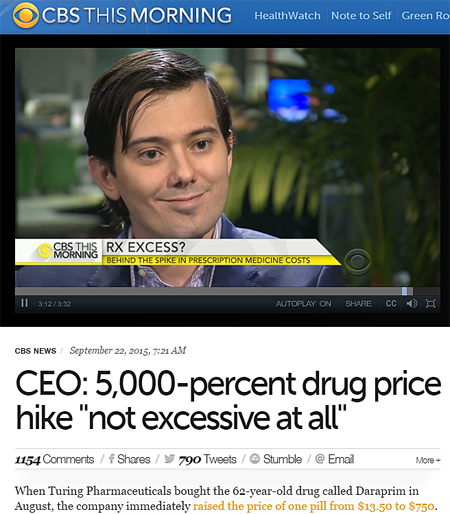


CEO Says “5,000% Price Hike On Daraprim Drug Not Excessive”
[by Howard Fencl, Hennes Communications]
Rarely do we see such a bracing, breathtaking display of contradictory messages and corporate spin as in the case of Turing Pharmaceutical’s 5,000 percent price hike of the toxoplasmosis drug, Daraprim. Toxoplasmosis is a parasitic disease that can kill people with compromised immune systems. Daraprim, once $13.50 per pill, was jacked up to $750 overnight when the company decided it was an overlooked opportunity for profitability and bought the drug. Turing was immediately pilloried in social media, on network and cable news, and by Hillary Clinton and Bernie Sanders. Patient advocacy organizations called for meetings with the company about the issue. Turing sent its 32-year-old CEO Martin Shkreli on the news circuit to answer questions about the drug’s dizzying price hike. Mr. Shkreli delivered a number of tone-deaf and contradictory messages, such as:
- The price hike is simply a smart business decision. The drug was unprofitable before; now the company can make a reasonable profit, so the increase isn’t excessive at all.
(CBS News reported that at $750 per tablet, “the average cost of treatment for patients rose from about $1,130 to $63,000. For certain patients, the cost can go as high as $634,000.”)
- While the move might look “greedy,” there are “a lot of altruistic properties to [the price increase].” Turing can now spend the new profits on a new toxoplasmosis drug.
(Dr. Wendy Armstrong, medical director of the Ponce de Leon Center in Atlanta and vice chair of HIV Medicine Association told Infectious Disease News that toxoplasmosis is “…not an infection where we have been looking for more effective drugs, it is a single pill — once a day — that has minimal side effects.”)
- Patients are Turing’s number one priority.
(Shkreli essentially told Bloomberg News it’s not fair to Turing that the cost of saving a life with Daraprim is only about $1,000, while life-saving cancer drugs cost patients $100,000 or more.)
The company eventually paid lip service to the public backlash by backing off on the price increase, but will not say by how much. And, a press release on Turing’s web site states the company will provide financial assistance to patients who cannot afford the drug. Mr. Shkreli reinforced this on Bloomberg News, but admitted the practice is an “impediment” to Turing’s profit goal (see http://bloom.bg/1Jl53hs beginning at 2:45).
The upside for the company is that after just a few days, the world certainly recognizes the Turing brand. The downside, of course, is that the takeaway from Mr. Shkreli’s whirlwind media junket is that Turing is a greedy company speaking out of both sides of its mouth, claiming it cares first about patients while levying stratospheric price increases in cavalier fashion to satisfy its profit motive.
As a spokesperson, Mr. Shkreli’s body language did nothing to help. His comportment screamed arrogance as he delivered message after message about profit motive, punctuating each reply with an inappropriate smarmy grin. The Atlantic calls Shkreli an “easily dislikeable villain.” And unfortunately, the greasy kid stuff congealed in his hair brings Martin Short’s sweaty SNL character “Nathan Thurm” to mind.
There is little the company did right in handling the situation, and as a result, it is now the poster child of predatory pharma. Ripping the Band-Aid off and admitting the Daraprim price increase concurrently with an announcement about the company’s financial assistance program would have helped mitigate public outrage. Identifying and media training an empathetic spokesperson would have helped. That did not happen. Mr. Shkreli has now gone silent. But it may be too late for Turing’s brand.